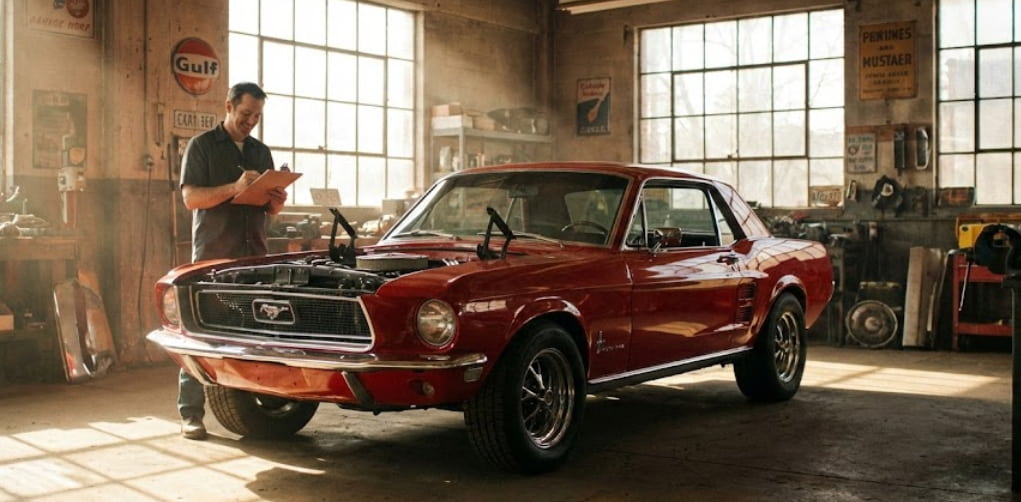
How To Register A Classic Car Without A Title In The US?
Owning a vintage beauty like a 1965 Ford Mustang or a 1957 Chevrolet Bel Air is the ultimate dream for many car lovers. But finding out that your dream ride is missing its title can quickly turn that excitement into stress. Titles are the legal proof of ownership, and unfortunately, they often go missing for older vehicles due to lost paperwork or casual record-keeping from decades ago.
Without a title, you can't drive legally, and selling the vehicle becomes a headache. Navigating the rules for Classic Car Registration USA can feel overwhelming because every state has different laws. You might worry about ownership disputes or hidden debts on the car.
This guide simplifies the entire process. We will walk you through practical solutions like bonded titles and state exemptions to help you get legal ownership. You will learn how to verify your car’s history, gather the right documents, and avoid common traps. Whether you just bought a barn find or won an auction, follow these steps to get your classic car on the road.
Key Takeaways
Understand why vintage cars often lose their titles.
Learn how to check if your state allows registration without a title.
Discover how a bonded title works to prove ownership.
Find out which states don't require titles for older cars.
Get a checklist of documents you need to avoid delays.
Why Is Your Classic Car Missing a Title?
Classic cars are usually vehicles between 25 and 35 years old often come without titles because of how things were done in the past. Before the 1970s, many states didn't even require titles. Back then, owners just used registration papers or handwritten bills of sale, especially in rural areas. For example, a 1963 Pontiac GTO sold in a small town might have only ever had a bill of sale, which is easy to lose over 50 years.
There are a few common reasons you might face this issue. Owners often misplace paperwork during long-term storage. If you find a barn find car with no title, the original owner might be impossible to track down. Private sales and auctions for pre-1973 models in places like New York might only provide a bill of sale. Some states, like Georgia, never even issued titles for older vehicles originally.
Buying a car without a title does carry risks. Without checking the Vehicle Identification Number (VIN), you could accidentally buy a stolen car or one with hidden debts (liens). A 1966 Chevy Chevelle with an old unpaid loan could cause you major legal trouble. You should always run a history report to spot these issues early.
Is It Even Possible to Register a Classic Car Without a Title in Your State?
Yes, registering a vehicle without a title is possible across the U.S., but the rules change depending on where you live. Your options usually include getting a bonded title, using an age-based exemption, or finding alternative registration methods. Your state’s DMV will decide if you are eligible based on the car's history and what proof you have.
First, you must ensure the car isn't stolen or carrying debt. A simple VIN inspection can confirm this. You will also need proof that you own the car, like a notarized bill of sale. For a deeper dive into the general rules, you can read our guide on classic car registration in any state.
Strict States: Places like California and Texas often require bonded titles and lots of paperwork.
Lenient States: Vermont and Alabama have easier rules for older cars.
Verification: Always run the VIN through the National Highway Traffic Safety Administration (NHTSA) decoder or your local DMV to verify the car is clean.
Contact your local DMV to ask about specific requirements like safety inspections or emissions tests, though these are often waived for antiques.
What Is a Bonded Title and How Does It Help You?
A bonded title is a special title issued by the DMV that includes a surety bond. Think of it as a safety net or insurance policy for the state. It protects the DMV and future owners for 3 to 5 years in case someone else comes forward claiming they actually own the car. If no one claims it during that time, you can usually swap it for a standard clean title.
This is a very common solution in states like Texas, Florida, and California. If you are unsure about the specific steps, our detailed post on how to get a bonded title for a classic car in the USA breaks it down further.
The bond amount is usually 1.5 to 2 times the value of the car. For example, if your 1970 Camaro is worth $25,000, you might need a bond for up to $50,000. Don't worry, you don't pay that amount! You only pay a small percentage (usually $100–$300) to a surety company to "buy" the bond.
How Do You Secure a Bonded Title Step-by-Step?
If you need a bonded title, here is the roadmap to getting it done:

Contact the DMV: Ask if you are eligible. Request specific forms, like a "Statement of Facts" or "Bonded Title Application." In Texas, for instance, this is Form VTR-130-SOF.
Verify the VIN: You must have the car inspected by police or a DMV-approved inspector. This proves the car matches its paperwork and isn't stolen. If you are dealing with a car that has no VIN tag, check our no VIN classic car guide for help.
Get an Appraisal: A professional must tell you what the car is worth. This determines the size of the bond you need.
Buy the Bond: Purchase the surety bond from a licensed insurance or surety company.
Submit Everything: Take your bond certificate, appraisal, application, and fees (usually $50–$300) to the DMV. Once approved, you get your title and license plates.
This whole process usually takes 4 to 8 weeks.
Which States Allow You to Register Classics Without a Title?
Some states make it much easier for classic car owners by waiving the title requirement entirely for vehicles over a certain age. In these states, a bill of sale and a VIN inspection are often enough.
Even in these states, you still need to prove you didn't steal the car. You will likely need a notarized bill of sale and to verify the VIN. For owners in Big Sky Country, our Montana classic car registration guide explains another popular option for avoiding strict state rules.
Are There Alternatives to Bonded Titles?
If a bonded title sounds too expensive or complicated, you have other options.
1. The Bill of Sale Method
In the exempt states listed above, a notarized bill of sale is your golden ticket. It must include the seller’s name, buyer’s name, date, price, and vehicle details. For example, registering a 1962 Ford Thunderbird in Georgia is straightforward with just this document and proof of the car's age.
2. Out-of-State Registration
You can register your car in a state with friendlier laws, like Montana, even if you don't live there. This is often done by forming an LLC. This method can also save you money on sales tax. If you need classic vehicle registration assistance to set this up correctly, professional services can handle the paperwork for you.
3. Court-Ordered Titles
If you have had the car for a long time but no paperwork, you might be able to petition a court to award you the title. This is often used for "barn finds" or abandoned cars. It takes longer (3 to 6 months) but is very effective.
What Documents Do You Need to Start?

Before you head to the DMV, gather these essential items to avoid being turned away:
Bill of Sale: Ideally notarized. It proves you bought the car legally.
Proof of Identity: Your driver's license or ID.
Affidavit of Ownership: A written statement explaining how you got the car and why the title is missing.
VIN Inspection Report: Proof that law enforcement or a certified inspector checked the VIN.
Surety Bond: (If applying for a bonded title).
Proof of Originality: Sometimes needed to prove the car is a true classic. See our guide on how to verify classic car originality.
Insurance: Proof of valid insurance for the vehicle.
What Common Mistakes Should You Avoid?
Registering a title-less car is tricky, and small mistakes can cause big delays.
Skipping the VIN Check: Never buy or try to register a car without checking the VIN first. If it comes back stolen, you lose the car and your money.
Missing Signatures: Simple errors, like a missing signature on a bill of sale, will get your application rejected.
Ignoring Hidden Costs: Budget for more than just the registration fee. You need money for the bond, the appraisal, and inspections.
Not Using Notaries: Many DMV forms must be notarized to be valid. Don't skip this step.
How Much Time and Money Does This Cost?
The cost and time vary depending on the method you choose.
Timeline:
Exempt States (e.g., Alabama): Days to a few weeks.
Montana LLC: 3 to 6 weeks.
Bonded Title: 4 to 8 weeks.
Court Order: 3 to 6 months.
Estimated Costs:
Surety Bond: $100 - $300 (varies by vehicle value).
Appraisal: $50 - $200.
Registration Fees: $50 - $300.
Inspections: $25 - $100.
Total Range: Expect to spend between $225 and $900 to get everything legal.
Why Choose Street Legal Hookup for Vehicle Registration? We Put Your Needs First
Registering a classic car without a title can be confusing and time-consuming, with state-specific rules, inspections, and paperwork. Street Legal Hookup simplifies the process, providing a reliable, nationwide solution that saves you time, money, and stress.
Our Expertise
Nationwide Coverage: We handle title-less classic car registrations in all 50 states, including bonded titles, exemptions, and alternative registration methods.
Step-by-Step Guidance: Our team walks you through VIN inspections, appraisals, lost title affidavits, and state-specific paperwork.
Fast Online Process: Complete your registration from home, with clear instructions and no DMV lines.
Cost Savings: Avoid unnecessary fees and taxes with expert advice, including Montana LLC registration options to reduce costs.
Trusted Support Team: Whether your car is a barn find, estate purchase, or auction classic, we ensure every document and submission meets legal requirements.
Peace of Mind: All registrations are fully compliant with state laws, giving you confidence that your classic car is legally recognized.
Frequently Asked Questions
How do I register a vehicle if I don't have a title?
You can typically use a bonded title, register it in a state that doesn't require titles for old cars (like Alabama), or use an out-of-state registration service. You will almost always need a bill of sale and a VIN inspection.
Can I get a title with only a bill of sale?
In some states, yes. If the vehicle is old enough (usually 25–35+ years), states like Alabama, Georgia, and New York may allow you to register it with just a notarized bill of sale and a VIN verification. In other states, a bill of sale is just the first step toward getting a bonded title.
What are the risks of buying a car without a title?
The biggest risks are that the car might be stolen, have a "salvage" history, or have unpaid liens (debts) attached to it. If a car has a lien, the previous owner's bank technically owns it. You can learn more about vehicle history and theft checks at the National Insurance Crime Bureau (NICB).
What if I can't find the title to my car?
If you lost the title to a car you already registered in your name, you can simply apply for a duplicate title at your local DMV. If you bought a car and never received the title, you will need to pursue a bonded title or use a registration service to establish ownership.
Can I use a Montana LLC to register my classic car?
Yes. A Montana LLC allows you to register vehicles in Montana without living there. This is a legal and popular method for classic car owners because Montana has no sales tax and friendly registration rules for older vehicles. Services like Street Legal Hookup can set this up for you safely.
Conclusion
Registering a classic car without a title in the US requires navigating state-specific regulations. Bonded titles, backed by a surety bond for car titles, offer a secure path. Exemptions in states like Alabama or Vermont allow registration with a bill of sale for antique cars.
Out-of-state options like Montana LLCs provide flexibility. Start with a VIN inspection and gather notarized documents. Budget $225 to $900 for fees, appraisals, and bonds, and plan for 4 to 8 weeks. Avoid pitfalls like skipping VIN verification.



